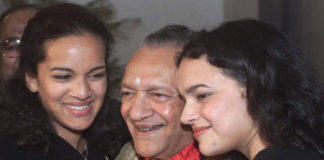Andrew Scheer says Justin Trudeau’s disastrous trip to India damaged this key relationship
The Canadian Bazaar
TORONTO: After the controversy-marred visit of Prime Minister Justin Trudeau to India in February, Conservative leader Andrew Scheer seems to have had a very successful trip of that country.
Before he left for his nine-day trip to India earlier in October, Scheer had said that “Justin Trudeau’s disastrous trip to India damaged this key relationship’’ and that he would try to “repair and strengthen’’ this relationship during the visit.
As it happened, the Indian trip proved to be very successful for the Canadian opposition leader.
He was welcomed with open arms by not only Prime Minister Narendra Modi, but also his three top cabinet ministers — home minister Rajnath Singh, external affairs minister Sushma Swaraj and finance minister Arun Jaitley.
No leader of a foreign opposition political party visiting India in recent years has managed to have one-on-one meetings with so many top Indian leaders.
After the fiasco of the Trudeau visit, the Indian leadership probably wanted to send a very strong message to Canadian politicians about their embrace of radical elements in the Indo-Canadian community.
Interacting with the Indo-Canadian business community at an event organized by the Canada India Foundation at the elite University Club in downtown Toronto on his return, the Conservative leader was all smiles as he shared his experiences of his maiden trip to India.

It was a fantastic visit, said Scheer.
He said India is important for Canada not only because it is one of the fastest growing economies in the world, but also because of our shared values. “We have the same commitment to tolerance and equality of people. And we have the same commitment to freely trading with other likeminded countries so that we all take advantage of our common growth together.’’
Andrew Scheer said he went to New Delhi to send the message that “Canada will prioritize our relationship with India.”
Referring to India’s rapid economic growth over the last few years, the Conservative leader said if the Canadian economy too were to grow at the rate of 7.5, 7.8 or 8 percent, “we will be popping champagne in the House of Commons. (But) in India it has become almost the new normal. When it is not, then there are questions: what happened.’’
He said before the trip he got the feedback here – which was reinforced during the Indian trip – that “although the trade between Canada and India has also accelerated over that time, it is not growing at the same rate and that there are things that both governments can do to enhance that.’’
During his discussions with Indian ministers, he said, both sides agreed that our interests are complementary, not competing.
“When one country does well, the other benefits… there is not competition in the sense that if Canada’s economy goes up, India’s economy goes down. In fact, it is the opposite — that prosperity is contagious and that we can prosper together in a mutually beneficial way… That message was very well received.’’
Scheer described his meeting – first of the trip – with Sushma Swaraj, minister for external affairs, as `fantastic.’
Canada understands India’s challenging environment in that region where not every neighbour shares the same commitment to democracy, the rule of law and equality as India. Then there are the economic challenges that India faces by other countries that don’t have the same kind of freedoms and economies, Scheer said.
During those discussions, he said, his message that Canada under a Conservative government would prioritize trade relations with India was very well received by the country’s leadership.
Thanking Modi for taking time off his business schedule to meet him, Scheer said he truly appreciated the gesture by the Indian Prime Minister.
“Being the prime minister of a country of over a billion people and so close to the elections, and then to carve out some time to discuss relations between Canada and India with me, I truly appreciate that.’’
Amid applause from the audience, Scheer said his meeting with Modi was supposed to last only 15 minutes, but it went well over half an hour.

The Conservative leader said they discussed the reforms that the Indian Prime Minister has introduced so that every Indian benefits from the country’s incredible rate of grow.
Scheer said some of the reforms Modi has introduced — such as bank accounts for more and more people so that they build credit history and access to online tools for more and more people – are very practical.
He also spoke about Modi’s sanitation drive in rural areas so that every Indian house has access to clean water and sanitation services.
“He has invested in that human capital,’’ Scheer said of Modi’s initiatives for the common man.
Among the geopolitical issues, he said, the two leaders discussed India’s quest for access to “safe and responsible energy’’ and how Canada could meet its energy demands.
“That’s why I sent the signal that the Conservative government in 2019 will fix the regulatory mess … and get finally get a pipeline to western Canadian deep waters’’ so that Canadian crude could be shipped to to the Indo-Pacific region, including India, Scheer said amid thunderous applause from the gathering.
He recounted his visit to the world’s largest refinery at Jamnagar in Gujarat, calling it an `engineering marvel.’
“We could be selling much more raw material to that refinery,’’ he said.
Amid laughter, Scheer said that Indian refinery imports raw materials from Canada, refines them and sends its products back to eastern Canada because western Canadian energy cannot be transported to eastern Canadian markets.

That’s why, he said, the Conservatives will build the Energy East pipeline project.
He said though “Indians have positive impression of Canada and affinity for Canada,’’ Canada needs do a lot more to promote its brand.
The Conservative leader said we need to promote brand brand in the highly competitive world. “Canada has to be the place where people want to invest.’’
During his trip to Bengaluru, Scheer said, he was able to see the “exciting high-tech in India.’’
He said he enjoyed his trip thoroughly and appreciated Indian hospitality which, he said, is “the hallmark of your culture.’’
————-
Scheer on breaking trade barriers with India
“Any time you tear down trade barriers, remove tariffs and duties, eliminate non-tariffs, you are going to see natural growth in trade. That is something that the government of India has said in the past. But there are domestic issues (in India) that have to be resolved or at least incorporated as part of a longer-term plan, as they are in Canada. But you will see awareness from both the Conservative government here and Prime Minister Modi’s government in India. We are reducing those trade barriers. I know India wants to be a global exporter of many things and they have a lot of competitive advantage…’’
———-
3 steps Scheer will take on India relations
1: Security: “I would like to explore the potential of enhancing security cooperation. Canada and India have taken steps to address that. But there is more we can do.
“Any time two countries trust each other when it comes to security, then a lot of things follow with that. We know there are countries around the world that are engaging in everything – from cyber attacks to hacking into institutions. Canada has been a victim of it in the past, India has its concerns. When we can share that type of information and technology – whether it is national security or cyber security – that will bring us closer together.’’
2: Tariffs: “Talk about reducing trade barriers as we work closer towards more freedom in trade.’’
3: Contacts: “Stronger contacts and having more high-level visits and welcoming those we want to come (to Canada).’’
————–
Scheer on diversity and inclusion
“Canada didn’t go about deciding that we are going to be a diverse country and started bringing in people from different parts of the world. We decided a long time ago that we are going be a country that celebrated freedoms and that we would protect people’s freedom of religion, freedom of speech, freedom of expression and we will celebrate that you can come from anywhere in the world and pass on your traditions, pass on your faith, pass on your language. And that has resulted in this country being so diverse. Because it is the type of place where people want to come to and the type of place where people can carry on being who they are.
“Diversity is a product of our strength, and our strength has always been our freedom, our openness.’’
—————-

Mr Scheer has shown amazing wisdom with India initiative, says CIF chairman Anil Shah
Welcoming Scheer, Canada India Foundation chairman Ani Shah praised him for his “amazing wisdom in taking the initiative to improve Canada’s relations with India even while in the Opposition.’’
He said the Canada India Foundation is confident that “when Mr. Scheer is in power, we will once again see a rapid growth of ties between our democracies.’’
Shah said, “CIF comprises a group of like-minded individuals of Indian origin who are business and community leaders in Canada and highly successful in their respective field and carry a huge passion for Canada-India bilateral relations and contributing back to the society through their philanthropic efforts.’’
He said the last decade has been one of the best phases of Canada – India relations and “our public policy advocacy group has tangibly contributed to this improvement in relations.’’
As a secular, non-partisan Canadian organisation, the CIF’s key objective is to advocate that decision-makers focus on matters that have a material bearing on relations. “It also consistently raises its voice against identity politics.’’
He said an important aspect of our objectives is to recognise a `Global Indian’ each year.
“We honour a Global Indian who has contributed to enhancing India’s image globally.
“We give the person an award at our Annual Global Indian Award Gala and give 50,000 dollars to the charity of the award winner’s choice.
“Earlier this year, we honoured an American of Indian origin – a young lad of 15, Sparsh Shah, who was born physically challenged and has been wheelchair bound since birth.
“Despite this, Sparsh has a global reputation as a rapper and a motivational speaker.
“In the past, we have honoured Ratan Tata, Sam Pitroda, NR Narayana Murthy and Baba Ramdev, among others.
“Prime Minister Stephen Harper was the chief guest at our first Award Gala in 2008 when we honoured Sam Pitroda, the person who revolutionized India’s telecommunications sector.’’
We also hold discussion forums in economic sectors that are of significance to Canada and India.
We invite experts to provide new direction that the two countries need to take to enhance economic cooperation.
We held a Higher Education Forum in July and are planning another one in January next year in India.
Friends, CIF is committed to its mandate, we welcome your participation and engagement to our cause
So, let me just say, thank you Honourable Andrew Scheer for coming to Toronto.
We are confident that we will be working closely in the future.
————-

We welcome Mr Scheer’s sincerity, says CIF national convenor Satish Thakkar
On his recent trip to India, Mr. Scheer told Prime Minister Narendra Modi that he will make India a core player in Canadian foreign policy considerations and energy exports when he becomes prime minister.
We at Canada India Foundation admire and welcome sincerity towards this relationship.
Friends, as you all know, Canada India Foundation has new leadership now. I would like to take this opportunity to acknowledge the stellar contributions of successive leadership.
We have with us today our past chairs Ajit Someshwar, Dr. VI Lakshmanan, Ramesh Chotai and members of the board of governors
An institution that has been around for a decade has already proven its worth. The CIF has contributed tangibly to the rapidly improving bilateral relations between Canada and India.
The focus of the new leadership team is to make CIF an effective public policy advocacy platform to raise awareness about all issues pertaining to Canadians of Indian origin.
The CIF has consistently advocated for a better engagement of qualified Indo-Canadians into the Canadian mainstream. To this end, we will renew our effort to focus on youth engagement in the public policy arena.
———–

Mr Scheer has given best definition of diversity, says CIF founder chair Ajit Someshwar
I have heard many definitions of diversity in Canada. But Mr Scheer’s explanation, during his speech, that diversity is the result of freedom and openness that we have consistently practised in Canada, is the best I have ever heard.
We must not be biased based on our political acceptance of certain communities. The concoction of vote bank politics and mistaken notion of support for diversity must be avoided.
The Conservative leader also appreciates that the interests of Canada and India are complementary – food security, energy security and human capital security.
READ ALSO: CIF demands that Canada should accept Afghan Sikhs and Hindus as refugees








